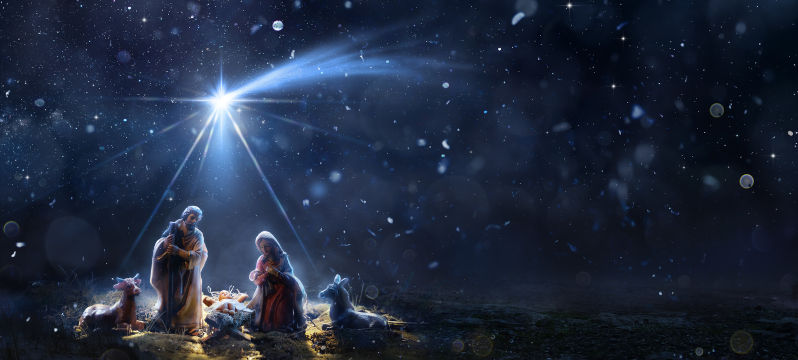Christmas: Beyond the fantastical
December 23, 2024
One of the fondest memories we carry is of how when we were young, the world was infused with magic, especially at Christmas. We would wake on Christmas Day surrounded by the gifts Santa Claus had mysteriously placed there.
As we grew the magic died, yet so drawn are we to it, we wish we were able to suspend our critical thinking, though clearly we can’t.
I believe the same is true when we come to the magic and fantastic events of the Christmas stories.
Some of the stories and the symbols at the very heart of the Christmas celebration are not even found in the biblical tradition. Thus, there is nothing for instance to tell us that Jesus was born in a stable, Matthew telling us rather the birthplace was a house.
The date, clearly, is a direct co-option of the Roman Saturnalia festival, shepherds hardly likely to be in the fields with sheep in the dead of winter.
Turning to the Christian Scriptures, the earliest writings, the epistles of Paul, and the Gospel of Mark, tell us nothing of the birth of Jesus, while when we arrive at the earliest accounts of Christmas in the gospels of Matthew and Luke they are almost entirely different, both quite incredible, making little sense to the modern mind.
We can hardly believe in stars travelling at walking pace relative to the speed of the earth, virgin births, and angelic choruses, any more than we can in fairies at the bottom of the garden.
We suspect that the birthplace of Jesus was moved from its real location in Nazareth to Bethlehem in entirely different means, so to fulfil the prophetic insistence that the Messiah must be born in that auspicious town of David, rather than in Nazareth, nowhere referred to in the Jewish Scriptures.
To get Jesus to be born in Bethlehem, Matthew and Luke employ opposing means. Luke has an otherwise unknown census called to get the family, resident in Nazareth, to Bethlehem, in which place they are clearly secure, given their numerous public appearances, while Matthew has the family already resident in Bethlehem, from where they, being in mortal danger, must flee, first to Egypt, and then later to Nazareth.
Virgin births are clearly unbelievable for us in an age of modern gynaecology, while to think that a king, Herod would be threatened in any way by the birth of a peasant infant, needs us again to suspend critical thinking.
While clearly not factual, the Christmas stories tell us many things. They do so as myth, a word having nothing to do with falsehood, but rather with those types of truth beyond the factual, to do with meaning and significance. In such their profound truth is found.
In Jesus they claim, light has shone into the darkness, hence the star in Matthew and the radiant glory of the angelic chorus in Luke.
Likewise his birth. It must be special, born of a virgin, something expected of significant figures in the ancient world, where divine-human liaisons were common, leading to the births of ‘the great.’ That greatness brings significant eastern visitors, ecstatic announcements by Simeon and Anna in the temple, and Herod’s fear.
This virgin birth, however, is different from the norm in antiquity in that the one through whom God procreates is a young woman from the lowest of classes. This special one born will announce a reign standing at such odds to the kingdoms of this world, that Herod, representative of these kingdoms must necessarily fear him, hence the massacre of the innocents, again for which there is no historical evidence, though such would not be beyond a tyrant, of whom Augustus, knowing of Herod’s murder of his wife, Mariamne and two sons, reportedly quipped, ‘It is better to be Herod’s pig than son.’ Kosher observance would prevent his pig suffering the fate of Herod’s family.
The writers by composing these incredible stories are affirming something they held to be deeply true; in Jesus God has come to us in a way of total identification, specifically with the poor and marginalised, those, like Jesus often forced onto the world’s roads and oceans as refugees.
The church was slow to celebrate Christmas, not doing so until the 4th century, but the season does catch a profound truth, if we can get beyond the unbelievable stories and sentimentality. Beyond that, we will grasp some of their deep significance.
In a season of heightened celebration, and even frivolity, of visiting friends and relatives, there are many who feel their suffering and loneliness more intensely. Familial tensions may explode into violence. Those working in welfare or mental health know this season as peak time.
This year near those places Jesus trod, violence and massacre is being unleashed at a horrendous level. The innocents are being slaughtered in numbers inconceivable to even Herod. Could there be a stronger contrast between the way of Jesus and those now in power in the land from where he came? Any Christmas celebration this year cannot help be affected by the agony and atrocity of Gaza.
Christmas affirms God’s being with us in total identification and calls us likewise to be present to one another.
Let that presence, especially to those most vulnerable and often despised, be that which motivates us this Christmas especially, for that is the essential truth to which these incredible stories point. In that the Divine is again made incarnate.

